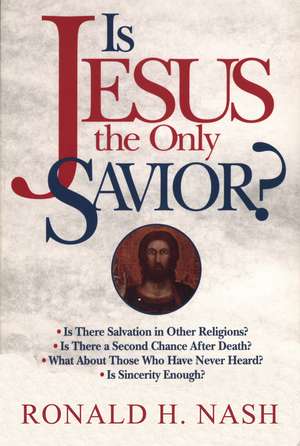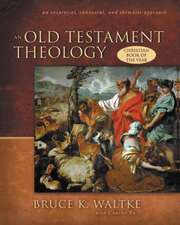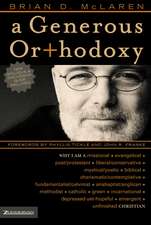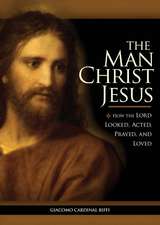Is Jesus the Only Savior?
Autor Ronald H. Nashen Limba Engleză Paperback – 11 iul 1994
Today, professing that Jesus Christ is the only way to approach God and receive his salvation may seem to some like a form of intolerance or arrogance. A growing number of Christian intellectuals, pastors, and leaders are favoring a more inclusive view of a person's path to salvation.
But what does this mean in practice? Are there biblical or theological means of defending inclusivism or pluralism, or do these views simply pay tribute to modern ethical standards?
The fact is that unity among Christians on this fundamental issue has disappeared. Many people of faith choose among three fundamentally different answers to the question, "Is Jesus the only Savior?" Stated succinctly, these answers are:
- No! (Pluralism)
- Yes, but... (Inclusivism)
- Yes, period! (Exclusivism)
Christians of all walks of life will find their faith in Christ affirmed and strengthened by this vital treatise, written in accessible terms and a readable style.
Preț: 90.91 lei
Nou
Puncte Express: 136
Preț estimativ în valută:
17.40€ • 18.60$ • 14.50£
17.40€ • 18.60$ • 14.50£
Carte disponibilă
Livrare economică 28 martie-11 aprilie
Preluare comenzi: 021 569.72.76
Specificații
ISBN-13: 9780310443919
ISBN-10: 0310443911
Pagini: 192
Dimensiuni: 155 x 229 x 12 mm
Greutate: 0.23 kg
Editura: Zondervan Academic
Colecția Zondervan Academic
Locul publicării:Grand Rapids, United States
ISBN-10: 0310443911
Pagini: 192
Dimensiuni: 155 x 229 x 12 mm
Greutate: 0.23 kg
Editura: Zondervan Academic
Colecția Zondervan Academic
Locul publicării:Grand Rapids, United States
Descriere
A compelling and urgent case for Jesus Christ as the one and only way to salvation.
Today, professing that Jesus Christ is the only way to approach God and receive his salvation may seem to some like a form of intolerance or arrogance. A growing number of Christian intellectuals, pastors, and leaders are favoring a more inclusive view of a person's path to salvation.
But what does this mean in practice? Are there biblical or theological means of defending inclusivism or pluralism, or do these views simply pay tribute to modern ethical standards?
The fact is that unity among Christians on this fundamental issue has disappeared. Many people of faith choose among three fundamentally different answers to the question, "Is Jesus the only Savior?" Stated succinctly, these answers are:
Christians of all walks of life will find their faith in Christ affirmed and strengthened by this vital treatise, written in accessible terms and a readable style.
Today, professing that Jesus Christ is the only way to approach God and receive his salvation may seem to some like a form of intolerance or arrogance. A growing number of Christian intellectuals, pastors, and leaders are favoring a more inclusive view of a person's path to salvation.
But what does this mean in practice? Are there biblical or theological means of defending inclusivism or pluralism, or do these views simply pay tribute to modern ethical standards?
The fact is that unity among Christians on this fundamental issue has disappeared. Many people of faith choose among three fundamentally different answers to the question, "Is Jesus the only Savior?" Stated succinctly, these answers are:
- No! (Pluralism)
- Yes, but... (Inclusivism)
- Yes, period! (Exclusivism)
Christians of all walks of life will find their faith in Christ affirmed and strengthened by this vital treatise, written in accessible terms and a readable style.
Cuprins
Contents Preface1.Is Jesus the Only Savior?Part OnePluralism 2.The Early Stage of John Hick’s Pluralism3.The Second Stage of Hick’s Pluralism4.Reason, Truth, and Religious Pluralism5.Pluralism and the Christian Understanding of Jesus Christ6.Final Thoughts on Hick’s PluralismPart Two Inclusivism 7.An Introduction to Inclusivism8.Inclusivism and Theology9.Inclusivism and the Bible10.Some Remaining Questions11.Why I Am Not an InclusivistBibliographyIndexes
Notă biografică
Ronald H. Nash (PhD, Syracuse University) was professor of philosophy at Southern Baptist Theological Seminary in Louisville, Kentucky. He was author of numerous books, including The Concept of God and Faith and Reason.












